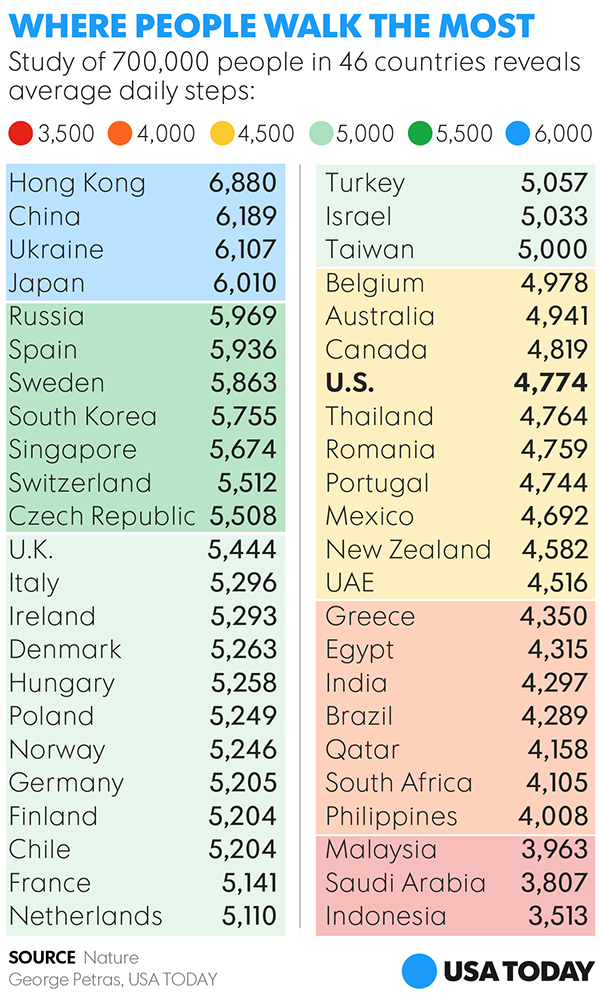- Joined
- Nov 29, 2016
- Messages
- 5,674
- Points
- 63
https://www.usatoday.com/story/news...st-countries-and-its-making-us-fat/471332001/
The U.S. is one of the world's laziest countries — and it's making us fat
Matthew Diebel , USATODAY Published 10:53 a.m. ET July 12, 2017 | Updated 10:58 a.m. ET July 12, 2017
Here are the top 5 best places for walking and biking in the U.S. according to Money. Buzz60's Djenane Beaulieu (@djenanebeaulieu) reports. Buzz60
GTY 456344098 A DIS USA NY
(Photo: Spencer Platt, Getty Images)
1961 CONNECTTWEET 88 LINKEDIN 57 COMMENTEMAILMORE
Many Americans are downright lazy. And it’s making us fat.
That’s among the findings of a study by Stanford University researchers using step-counters installed in most smartphones to track the walking activity of about 700,000 people in 46 countries around the world.
Scott Delp, a professor of bioengineering who co-led the research, told the BBC the “study is 1,000 times larger than any previous study on human movement.”
The least lazy, according to the study published in the journal Nature, are the Chinese, particularly those in Hong Kong, where people averaged 6,880 a steps a day.
The worst nation was nearby Indonesia, where people walked nearly half as much, averaging 3,513 steps a day. The worldwide average is 4,961 steps, with Americans averaging 4,774. (See chart below for full results of the survey.)
Does that mean Indonesians are much more likely to be obese than Americans? No, the researchers say. The key is the variation in the amount of walking.
In countries with less obesity, the Stanford researchers say, people typically walked a similar amount every day. In nations with higher rates of obesity, there were larger gaps between those who walked a lot and those who walked very little.
Among those latter countries is the United States, where “activity inequality” ranks Americans fourth from the bottom overall.
“If you think about some people in a country as ‘activity rich’ and others as ‘activity poor,’ the size of the gap between them is a strong indicator of obesity levels in that society,” Delp told the Stanford news site.
Related stories:
Five myths about walking vacations
Overweight kids are costing America billions
Obesity, inactivity could outpace smoking in cancer death risk
More than 2 billion are overweight or obese globally, new study says
Tim Althoff, who worked on the study, pointed to Sweden, with an average of 5,863 steps, as having one of the smallest activity inequality gaps. “It also had one of the lowest rates of obesity,” he said.
Another factor in activity inequality involved where people live: high-density cities or more suburban settings.
Jennifer Hicks, another researcher in the study, told the Stanford news site that they examined three California cities located close to one another – San Francisco, San Jose and Fremont. They found San Francisco held both the highest walkability score and the lowest level of activity inequality.
“In cities that are more walkable, everyone tends to take more daily steps, whether male or female, young or old, healthy weight or obese,” Hicks said.


The U.S. is one of the world's laziest countries — and it's making us fat
Matthew Diebel , USATODAY Published 10:53 a.m. ET July 12, 2017 | Updated 10:58 a.m. ET July 12, 2017
Here are the top 5 best places for walking and biking in the U.S. according to Money. Buzz60's Djenane Beaulieu (@djenanebeaulieu) reports. Buzz60
GTY 456344098 A DIS USA NY
(Photo: Spencer Platt, Getty Images)
1961 CONNECTTWEET 88 LINKEDIN 57 COMMENTEMAILMORE
Many Americans are downright lazy. And it’s making us fat.
That’s among the findings of a study by Stanford University researchers using step-counters installed in most smartphones to track the walking activity of about 700,000 people in 46 countries around the world.
Scott Delp, a professor of bioengineering who co-led the research, told the BBC the “study is 1,000 times larger than any previous study on human movement.”
The least lazy, according to the study published in the journal Nature, are the Chinese, particularly those in Hong Kong, where people averaged 6,880 a steps a day.
The worst nation was nearby Indonesia, where people walked nearly half as much, averaging 3,513 steps a day. The worldwide average is 4,961 steps, with Americans averaging 4,774. (See chart below for full results of the survey.)
Does that mean Indonesians are much more likely to be obese than Americans? No, the researchers say. The key is the variation in the amount of walking.
In countries with less obesity, the Stanford researchers say, people typically walked a similar amount every day. In nations with higher rates of obesity, there were larger gaps between those who walked a lot and those who walked very little.
Among those latter countries is the United States, where “activity inequality” ranks Americans fourth from the bottom overall.
“If you think about some people in a country as ‘activity rich’ and others as ‘activity poor,’ the size of the gap between them is a strong indicator of obesity levels in that society,” Delp told the Stanford news site.
Related stories:
Five myths about walking vacations
Overweight kids are costing America billions
Obesity, inactivity could outpace smoking in cancer death risk
More than 2 billion are overweight or obese globally, new study says
Tim Althoff, who worked on the study, pointed to Sweden, with an average of 5,863 steps, as having one of the smallest activity inequality gaps. “It also had one of the lowest rates of obesity,” he said.
Another factor in activity inequality involved where people live: high-density cities or more suburban settings.
Jennifer Hicks, another researcher in the study, told the Stanford news site that they examined three California cities located close to one another – San Francisco, San Jose and Fremont. They found San Francisco held both the highest walkability score and the lowest level of activity inequality.
“In cities that are more walkable, everyone tends to take more daily steps, whether male or female, young or old, healthy weight or obese,” Hicks said.


